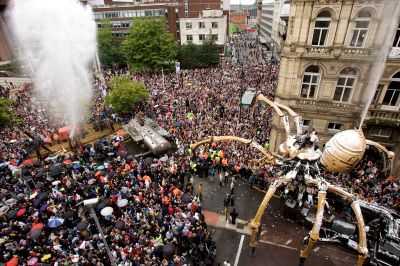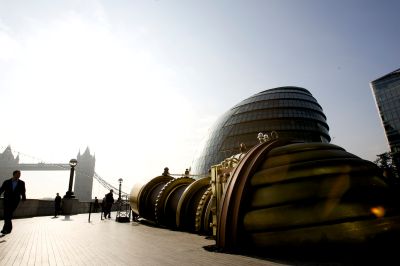As the Finance Director of Artichoke, Neil Goulder has spent years ensuring the financial foundations of this unique arts charity are rock solid. From the iconic Sultan's Elephant that drew a million people to London's streets in 2006 to the biennial Lumiere festival in Durham, Artichoke creates free, outdoor experiences that transform how communities see their world.

In this interview, Neil shares how he navigates the complex financial landscape of large-scale projects, the challenges facing the arts sector, and why understanding the bigger picture is crucial for charity finance professionals working behind the scenes of extraordinary creative endeavours.
Please tell us about your charity and what you do...
Artichoke burst onto the scene in 2006 with a game-changing show: Royal de Luxe’s The Sultan’s Elephant. Over four days in May, a million people came out to watch as a giant elephant and princess made their way through the streets of London and up The Mall.
Since then, Artichoke has continued to invade public spaces, working with artists to realise their wildest dreams. We’ve worked across the UK and Ireland, in cities, in the countryside and around the coastline. Our projects always take place outside, are free and accessible to all, and include participatory programmes for local communities to get further involved. We want to transform the way people see their world through their encounter with an Artichoke event.
What makes your work important?
Artichoke's work is complex, and the teams that make it possible are extraordinarily talented. They need a sturdy infrastructure to support them, and we run super-efficient financial processes. Our IT is designed to allow effective communications and sharing of information whether someone is working in the office, at home, or out in the field.
Artichoke fundraises for each individual project, and the ambition and scale of the work involves large budgets. My work supports the development team in their fundraising efforts with statutory authorities, trusts and foundations, local business partnerships and individuals. In a challenging fundraising climate, Museums & Galleries Exhibition Tax Relief (MGETR) has become increasingly important.
Finance works smoothly in the background to ensure the rest of the business gets the support it needs. When we are at the top of our game, no-one notices we are there.

©MatthewAndrews
What do you find most valuable about your role? What do you enjoy most?
Alongside my primary role overseeing the smooth-running of the company’s financial operations, my digital and IT know-how means that I am also called on to support in these areas also: for example, implementing a new accounting system or cleaning data for a CRM. I love learning new skills and seeing the value they create.
Throughout my career, I have identified what skills are needed by the business that are not covered elsewhere and filled the gaps. The desktop publishing and design skills I have acquired along the way allow me to present documents that are clear and aesthetic.
What financial challenges have you faced during the past year?
The arts sector is feeling very bruised at the moment, but there is still a huge demand for companies that can produce something that is bold and imaginative. Our costs increase annually, while our grant income and local authority commissions are static. Against this backdrop, the introduction of Museums and Galleries Exhibition Tax Relief (MGETR) has helped us enormously. To meet these challenges, I have created a simplified version of Artichoke's financial model and maintain an outline two year forecast to highlight any problems on the horizon.
What are your aims for the next 12 months?
We are currently working on the November delivery of the ninth edition of Lumiere in Durham, the UK’s light art biennial, and my role is to keep the finances working smoothly, ensuring that our many sponsors and funders are invoiced in a timely manner, and our suppliers are paid swiftly. We’re also completing the Research & Development phase and budgeting for our next big event.

©MatthewAndrews
What advice would you give other CFG members and small charities?
Invest as much time as possible in understanding the overall shape of the charity's business model, and longer-term strategy. We spend much of our daily lives focusing on tactical decisions and budget variances, but the big picture is what's really important.
And on a more technical level, try to ensure that your reports, spreadsheets and presentations are well-designed and provide clear information. In my experience, no-one wants to be confronted by a wall of numbers.